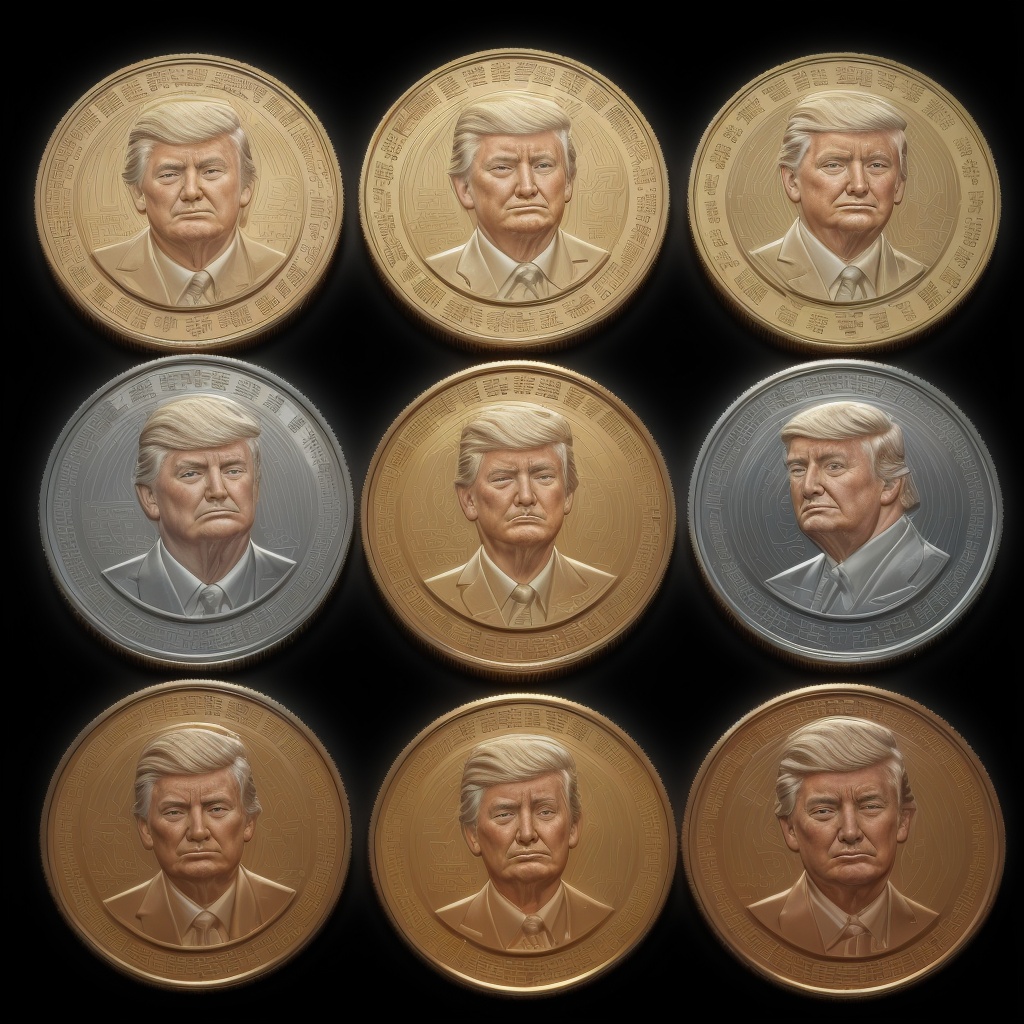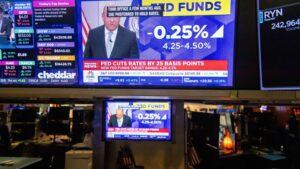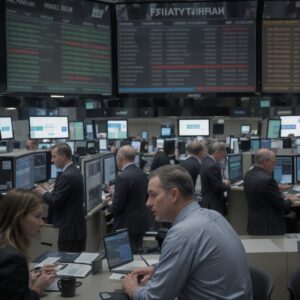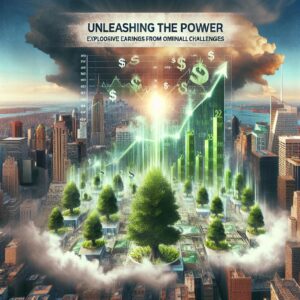summary
Unleash the Craze: Trump’s Meme Coin exemplifies the increasingly popular yet controversial world of meme coins, a subset of cryptocurrencies. These digital assets, created for humor and community engagement, derive their names from popular culture aspects like characters, internet memes, or notable individuals. Despite their comedic origins, meme coins have garnered significant attention and can yield substantial profits. However, they also pose considerable risks due to their high volatility, susceptibility to market manipulation, and potential security issues. The prominence of meme coins has surged in recent years, fueled by the virality of social media platforms, influencers, and online communities. Celebrity tokens, a specific type of meme coin, have seen particular growth.
The notoriety of meme coins has sparked the interest of regulators worldwide. Regulatory bodies like the SEC and the UK’s Financial Conduct Authority have begun to scrutinize the meme coin market to safeguard investors from inherent risks and potential fraudulent activities. The decentralization of these currencies raises concerns about effective regulation and jurisdictional issues.
The page “Unleash the Craze: Trump’s Meme Coin” delves into the specific case of Donald Trump’s meme coin, launched before his second presidential inauguration. This instance highlights the growing trend of celebrity involvement in meme coins, which can lead to increased hype and valuation. However, it also underscores the controversy and criticism surrounding such ventures, as they can blur the line between political power and speculative finance. As such, the phenomenon of Trump’s meme coin serves as an insightful example of the increasingly complex and debated intersection of cryptocurrency, politics, and culture.
Origins of Meme Coins
Meme coins are a unique subset of cryptocurrencies, created with a strong emphasis on humor and community engagement. These digital assets are named after popular characters, individuals, animals, or other aspects of culture, attempting to foster a lighthearted and entertaining atmosphere for their user base. Examples of such meme coins include Dogecoin and Shiba Inu. Despite their comedic origins, meme coins have the potential to be profitable investments. However, like all cryptocurrencies, they are subject to significant volatility and may possess less liquidity than more mainstream coins.
Meme coins originated from internet memes or other humorous online phenomena, which is how they get their name. They can sometimes be referred to as ‘shitcoins’, a term used to denote cryptocurrencies of dubious value, authenticity, or utility. Despite this somewhat pejorative term, meme coins have found a niche in the cryptocurrency market. Their appeal lies in their often comical nature and the vibrant online communities that support their growth and development. They are also sometimes used to critique the cryptocurrency market or to make the world of digital currencies more accessible.
The growth and popularity of meme coins have surged over the past few years. This is due in large part to the influence of social media platforms, influencers, and online communities, which have fueled their virality. The rise in popularity of celebrity tokens, a specific sub-genre of meme coins, has also played a role. The price of these celebrity tokens often hinges on the media appearances of the individual they represent.
Nevertheless, while the popularity and profitability of meme coins have increased, they pose significant risks and challenges for investors, traders, regulators, and the broader crypto industry.
Investment in Meme Coins
Investing in meme coins is a decision that involves potential profit, significant risk, and a clear understanding of the volatile nature of cryptocurrencies . Initial investors in meme coins can acquire tokens at a relatively nominal cost. As the publicity of the meme coin increases, often amplified by social media and a sense of urgency to avoid missing out, the price of the coins can spike significantly. Early investors then have the opportunity to sell their holdings at a profit to later buyers .
However, these coins are highly volatile and can be subject to regulatory actions due to the potential for investor manipulation . As such, they also carry the risk of significant loss. A series of unfavorable market conditions, or decisions made by regulators, could impact their liquidity and market presence, and thus the value of an investor’s holdings . Furthermore, security is a major concern, as investors must take precautions to protect their coins from potential theft by hackers and other criminals .
Despite these risks, some meme coin projects have shown success and sustainability over time. For instance, Fartcoin’s valuation surpassed $2 billion in January 2025, following a resurgence of interest in meme coins after Donald Trump’s victory in the 2024 United States presidential election . It is worth noting that while some investors may find success in meme coin investments, others may fall victim to fraudulent schemes, as seen in a 2024 case in which a group of traders manipulated secondary markets to profit at the expense of others .
Investors interested in meme coins should approach them with extreme caution, treating them more akin to gambling or entertainment, rather than a traditional investment . By seeking legal guidance, keeping up-to-date with regulatory developments, and advocating for balanced and effective regulations, investors can better position themselves to capitalize on the opportunities presented by this rapidly evolving market, while minimizing their legal risks . In terms of market capitalization, meme coins are listed with the largest first, and then in descending order, similar to other types of digital currencies .
Regulatory Concerns
Regulators have shown an increased interest in the meme coin market to safeguard investors from the inherent risks. Enforcement actions have been taken against numerous cryptocurrency initiatives by the SEC, citing allegations of fraud and unregistered securities offerings. Meme coins could potentially face similar scrutiny should they be found to be in violation of securities laws.
In addition, the Financial Conduct Authority (FCA) in the United Kingdom has issued warnings concerning the risks of investing in meme coins. The FCA has also established guidelines for financial services firms and influencers who promote these assets.
There is a general consensus that regulation needs to be more stringent on celebrity endorsements of cryptocurrency. However, the challenge arises in determining which legal entity should assume authority over these financial tools. This introduces the argument that cryptocurrencies, including meme coins, should be classified as securities to fall under the SEC’s jurisdiction.
History and Evolution of Meme Coins
Created on blockchains, meme coins are hexadecimal numbers stored on these digital ledgers. Each coin is associated with a private key that represents ownership. The appeal of these coins is often enhanced through images of coins with amusing logos .
Trump’s meme coin, which was promoted with the statement “Have Fun!”, exemplifies this trend. The tokens were marketed as expressions of support, rather than as investment opportunities . The excitement around such coins, driven by expectations of policy changes and other actions, has often resulted in a significant rise in their prices . However, concerns exist about their susceptibility to large price fluctuations, and they are generally considered speculative assets .
Impact of Meme Coins
Even under bearish conditions, there’s potential for profit in the meme coin market. This notion holds that meme coins are always a good move in a bearish market, especially in 2023. The market conditions are often influenced by factors such as interest rates and policy changes.
Meme coins often rely on continuous buzz to sustain demand. The lack of new, engaging content or a shift in focus to another trending token could affect the price momentum of these coins. Negative headlines, particularly those that highlight political controversies or regulatory scrutiny, could harm the token’s reputation and result in sell-offs that drive the price lower.
$Trump – The Meme Coin of Donald Trump
Donald Trump launched the $TRUMP meme coin days before his second inauguration as the president of the United States. This move has significantly intensified the discourse at the intersection of cryptocurrency, politics, and culture.
Characteristics of Meme Coins
Meme coins are a type of cryptocurrency that serve no purpose beyond being a token of humor. Many meme coins are currently in circulation, and some have attained considerable value. These digital currencies often appeal to users interested in the meme or the online community that supports the coin’s development and growth. Although similar to cryptocurrencies like Bitcoin and Dogecoin in relying on blockchain technology and a proof-of-work system for transaction validation, meme coins differ in terms of functionality, purpose, and impact.
Global Phenomenon and Regulatory Challenges
Meme coins are a global phenomenon that transcend national borders and jurisdictions. The popularity of meme coins has increased notably in recent years, with Dogecoin being the most recognized example. Despite their global appeal, these digital currencies pose significant regulatory challenges due to their decentralized nature. Effective regulation requires coordination and cooperation across countries and regions, which may be difficult due to differences in legal systems, standards, objectives, or priorities.
Risks and Rewards
Investing in cryptocurrencies, and especially in meme coins, is considered high-risk due to the market’s volatility. However, this risk can potentially bring about high rewards. This notion was exemplified when some investors became “Dogecoin millionaires” following the coin’s drastic price surge in 2021.
Criticisms and Controversies
The launch of $TRUMP has sparked considerable controversy and criticism. Some consider the launch of a personal meme coin by a president as a dangerous convergence of political power and speculative finance. Furthermore, this move has been condemned as a violation of the duty of the office, with critics arguing that it uses the highest office of the land to promote a financial product designed to benefit a private individual at the public’s expense.
Celebrity Involvement
The $TRUMP meme coin is an example of the increasing trend of celebrity memecoins. Other celebrities, including Katlyn Jenner and Iggy Azalea, have also launched their own meme coins. Despite the hype surrounding these coins, they have often been associated with scams and manipulation of unsuspecting investors.
Regulatory Scrutiny on Meme Coins
Meme coins, cryptocurrencies created and traded for fun, hype, or social media, have come under regulatory scrutiny due to their high volatility and potential for investor manipulation. They pose a unique challenge to regulatory authorities as their activities might undermine the authority, effectiveness, or credibility of these bodies. Regulatory actions on meme coins have been observed worldwide, with countries such as Japan and Singapore establishing stringent rules for meme coin trading. These regulations aim to prevent market manipulation and enhance transparency.
Negative Impact on Meme Coins
Political controversies or regulatory scrutiny spotlighted in the media can damage the reputation of meme coins. Perceptions of these coins as overly speculative or controversial can sour market sentiment, leading to sell-offs and price drops. Additionally, meme coins face the risks of future legal crackdowns or reclassifications, which could impact their liquidity and market presence. Security risks are also a concern, with the necessity to safeguard coins from hackers and other criminal operators. It’s also notable that many meme coins suffer from liquidity issues due to low trading volumes, making it challenging for traders to sell their holdings at desired prices. Therefore, traders are advised to approach meme coins with extreme caution, treating them more as a form of gambling and entertainment than an investment for their portfolios.
Regulatory Uncertainties and Challenges
Despite the need for stricter regulation on meme coins, especially those endorsed by celebrities, a clear regulatory path is yet to be defined. With multiple legal actors involved, it can be difficult to assert which government agency should take responsibility over this financial tool. One argument is that cryptocurrencies should be classified as securities, thereby falling within the jurisdiction of the Securities and Exchange Commission (SEC). Nevertheless, it’s essential for potential traders to understand the regulatory landscape of meme coins in their respective countries before engaging in any trading activities.
The content is provided by Sierra Knightley, Financial Pulse Now























